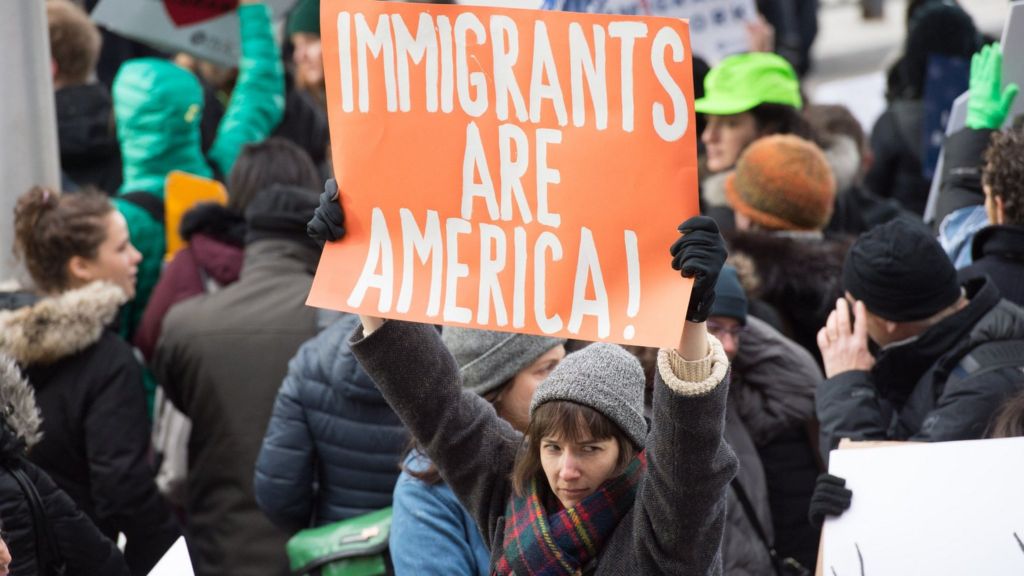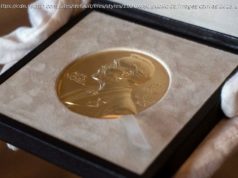 President Trump’s first week in office was widely regarded as a whirlwind.
President Trump’s first week in office was widely regarded as a whirlwind.
His second week has been no less hectic. Despite the mass protests of week one and falling approval ratings , the administration appears to be doubling down on its pledge to shake up the Washington playbook.
In a divided America, many people are repelled by the agenda and tone of this administration, while many others are pleased that their president is taking a bold stand and getting things done.
Here are five key things from week two in Trumpland.
On Friday, a week after his inauguration, President Trump issued an executive order suspending all refugee admissions for 120 days, banning Syrian refugees indefinitely and suspending arrivals from seven Muslim-majority countries for 90 days.
The immediacy of the announcement, which Mr Trump said was necessary to not allow any lag time for “bad dudes” to sneak in, caused widespread confusion at airports around the world.
Families were separated , and even Green Card holders from the affected countries were initially included in the ban. An Iraqi who put his life at risk as an interpreter for the US army was among hundreds of people detained at airports.
Around the world, travellers were prevented from boarding planes, and in some cases, were pulled off flights. Vetted refugees waiting to travel to the US despaired. An Iran-born BBC reporter with British citizenship was among those temporarily detained.
Demonstrators flocked to airports in protest, with many lawyers offering their services for free and filing emergency motions to have people released.
Mr Trump said the restrictions were required so new security measures could be put in place to protect America from possible terrorist attacks. Things were working out “very nicely”, he said.
Steve Gruber, a popular talk-show host in Michigan, summed up the mood among many Trump voters. Listeners, he said , “are encouraged that a politician, albeit a new one, is actually doing the things he said he would do”.
Several courts moved to block parts of the order being implemented, but reports said that border officers in some places were not complying with the rulings.
As condemnation grew, including from a few top Republicans, many foreign governments and major US companies , the White House insisted it was not a Muslim ban, pointing to the many Muslim-majority countries not involved.
Thousands join protests across UK
But former New York mayor Rudy Giuliani undermined that claim, admitting to Fox News that Mr Trump had previously asked him how to legally implement a ban on Muslims. He said, however, that the ban implemented was based on “danger”, not religion.
Sean Spicer, the White House’s combative press secretary, blasted journalists for reporting it as a travel “ban”, even though his boss used that very wording on Twitter.
Meanwhile, the world tried to figure out the unique language on display at protests in Scotland .
The immigration order’s fallout dominated headlines for most of this week.
“This has proven to be an embarrassing episode in what looks like a not-ready-for-primetime White House,” our correspondent Anthony Zurcher wrote.
Amateur hour at the White House?
But President Trump’s supporters think he’s doing a great job.
The former reality TV star now in the White House was this week finally given a chance to fire someone.
In the middle of the furore over the immigration ban, acting attorney general Sally Yates ordered justice department lawyers not to enforce President Trump’s executive order.
Within hours, she was dismissed and accused by President Trump of “betraying” her department and being “weak on borders”.
Some observers and journalists asked whether the dismissal would have a chilling effect across government. But the White House said justice department lawyers had deemed the order legal and thus Ms Yates was not fulfilling her duty.
The move came on the heels of other comments from the administration suggesting that dissent from officials would not be tolerated.
As news spread on Monday that hundreds of US diplomats around the world were planning to use a “dissent channel” to argue that the immigration restrictions would not make the US safer, Sean Spicer said “they should either get with the programme or they can go”.
That seemed like a pretty direct message to US government employees with independent views.
On Tuesday evening at a White House ceremony, Donald Trump unveiled his pick to fill the vacant seat on the Supreme Court – Judge Neil Gorsuch, of Colorado.
The Democrats, whom the administration has chastised for seeking to stymie them at every opportunity, have hinted they will use all means at their disposal to block his confirmation in the Senate.
The Supreme Court has the final say on such divisive issues such as abortion, gun control and gay rights. Since Judge Antonin Scalia died a year ago, the court has been split equally between liberal and conservative justices, at four each.
Whoever holds the ninth seat is thus pretty significant, though justices don’t always split on clear ideological lines. Barack Obama tried to replace Mr Scalia with a nominee of his choice, but the Republicans didn’t allow it given an election was forthcoming.
Like the late Mr Scalia, the Ivy-League educated Mr Gorsuch is known to support textualism, or the interpretation of law according to its plain text.
He also maintains a strict interpretation of the US Constitution, or how it was originally understood by the Founding Fathers.
Who is Neil Gorsuch?
Why is the US Supreme Court so important?
House Democratic Leader Nancy Pelosi called the nominee “a very hostile appointment” and “a very bad decision, well outside the mainstream of American legal thought”.
And of course, there were more protests.
Stephen Bannon, Donald Trump’s chief strategist, is a man who many people believe is behind much of what has come out of the White House in the past two weeks.
The former executive chairman of populist, conservative news website Breitbart has been described as a “rumpled right-wing agitator” by the New York Times.
On Saturday night, he was given a seat on the National Security Council’s inner circle, or principals’ committee.
Under the restructuring, the Joint Chiefs and director of national intelligence have been told only to attend when discussions pertain to their areas.
The move shocked many Washington veterans.
“It’s completely unprecedented to have a political adviser as a member of that group,” Eliot Cohen, director of the Strategic Studies Program at the Johns Hopkins University School of Advanced International Studies, told the BBC .






